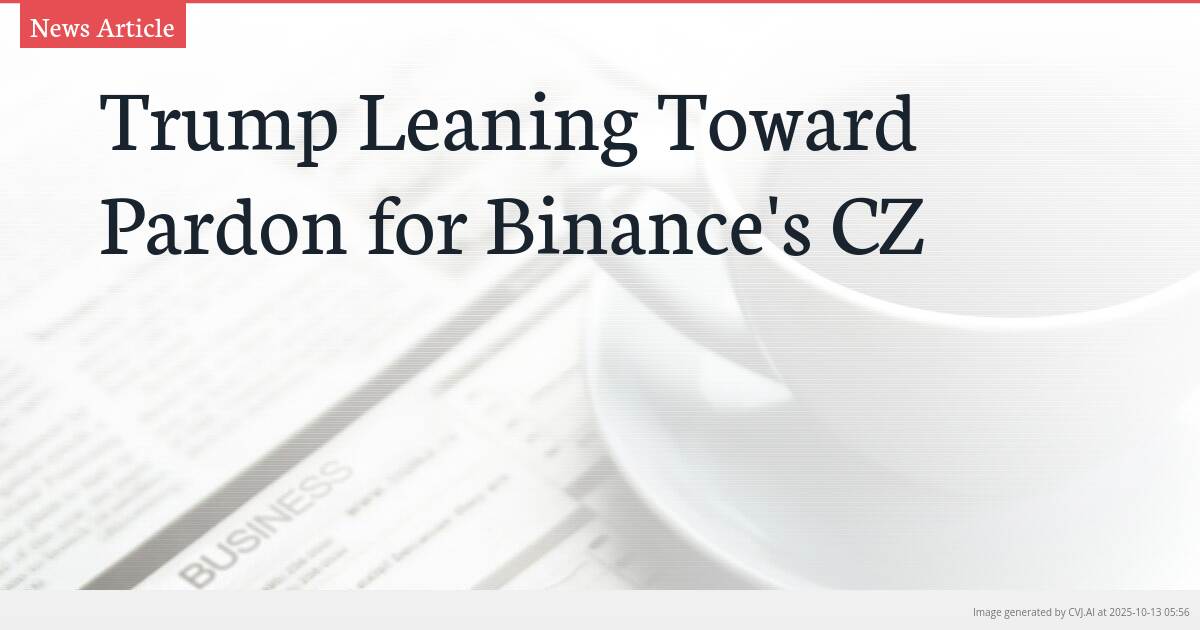This summary text is fully AI-generated and may therefore contain errors or be incomplete.
Introduction
Former President Donald Trump is reportedly considering a presidential pardon for Binance co-founder Changpeng ‘CZ’ Zhao, who served four months in prison after pleading guilty to money laundering charges in 2024. Zhao responded that such a pardon would be ‘great news if true,’ signaling potential relief for the embattled crypto executive. The development could pave the way for his return to active involvement in the cryptocurrency industry where he remains Binance’s largest shareholder.
Key Points
- CZ served four months in prison after pleading guilty to money laundering charges in 2024
- Trump insiders reportedly believe the case against Zhao was weak and didn't justify felony charges
- A pardon could enable CZ's return to Binance, where he remains the largest shareholder
The Case Against CZ and Trump's Pardon Consideration
The potential presidential pardon for Changpeng Zhao represents a dramatic turn in the legal saga that saw the Binance co-founder plead guilty to money laundering charges in 2024 and serve four months in prison. According to sources close to Zhao cited by New York Post columnist and Fox correspondent Charles Gasparino, Trump insiders believe the case against the cryptocurrency executive was ‘pretty weak, and certainly not something that merited a felony charge and jail time.’ This perspective from within Trump’s circle suggests a fundamental disagreement with the Department of Justice’s approach to prosecuting cryptocurrency industry leaders.
Zhao’s response to the pardon speculation—calling it ‘great news if true’—underscores the significant personal and professional stakes involved. The Binance founder’s legal troubles have kept him sidelined from the cryptocurrency exchange he built into a global powerhouse, despite his continued status as the company’s largest shareholder. The United States government’s case against Zhao and Binance represented one of the most high-profile enforcement actions in the cryptocurrency space, setting precedents for how regulatory authorities approach money laundering concerns in digital asset markets.
Implications for Binance and Crypto Markets
A presidential pardon for Zhao could have immediate consequences for Binance, the world’s largest cryptocurrency exchange by trading volume. With Zhao remaining Binance’s largest shareholder despite his legal status, his potential return to active leadership or advisory roles would mark a significant shift in the exchange’s governance and strategic direction. The cryptocurrency industry has closely watched Binance’s operations since Zhao’s guilty plea, with market participants assessing how regulatory compliance would evolve under new management.
The development comes at a critical juncture for cryptocurrency regulation in the United States, where authorities have increasingly scrutinized major platforms like Binance. A pardon would not only affect Zhao’s personal freedom but could also signal a different approach to cryptocurrency enforcement under a potential Trump administration. The news has already generated discussion within crypto markets about how regulatory certainty—or the lack thereof—impacts innovation and growth in the digital asset space.
Market observers are particularly watching how this development might affect Binance’s native cryptocurrency, BNB, which has maintained its position as one of the largest digital assets by market capitalization despite the legal challenges facing its founding team. The potential for Zhao’s return to more active involvement with Binance could influence investor confidence in both the exchange and its associated token, though the ultimate impact remains uncertain pending official confirmation of the pardon consideration.
Broader Political and Regulatory Context
The reported pardon consideration occurs against the backdrop of evolving political attitudes toward cryptocurrency regulation in the United States. Trump’s apparent willingness to revisit Zhao’s case suggests a potential shift in how the executive branch might approach cryptocurrency enforcement, particularly regarding cases that some view as overly aggressive prosecutions. This development raises questions about how future administrations might balance innovation in the digital asset space with legitimate concerns about financial crimes.
The money laundering charges to which Zhao pleaded guilty represented a landmark case in cryptocurrency regulation, establishing important precedents for how existing financial laws apply to digital asset exchanges. A presidential pardon would not overturn those legal precedents but could influence how aggressively they’re enforced in future cases. The situation highlights the ongoing tension between regulatory oversight and innovation in the rapidly evolving cryptocurrency industry, with significant implications for how United States-based companies operate in global digital asset markets.
📎 Read the original article on cointelegraph.com

